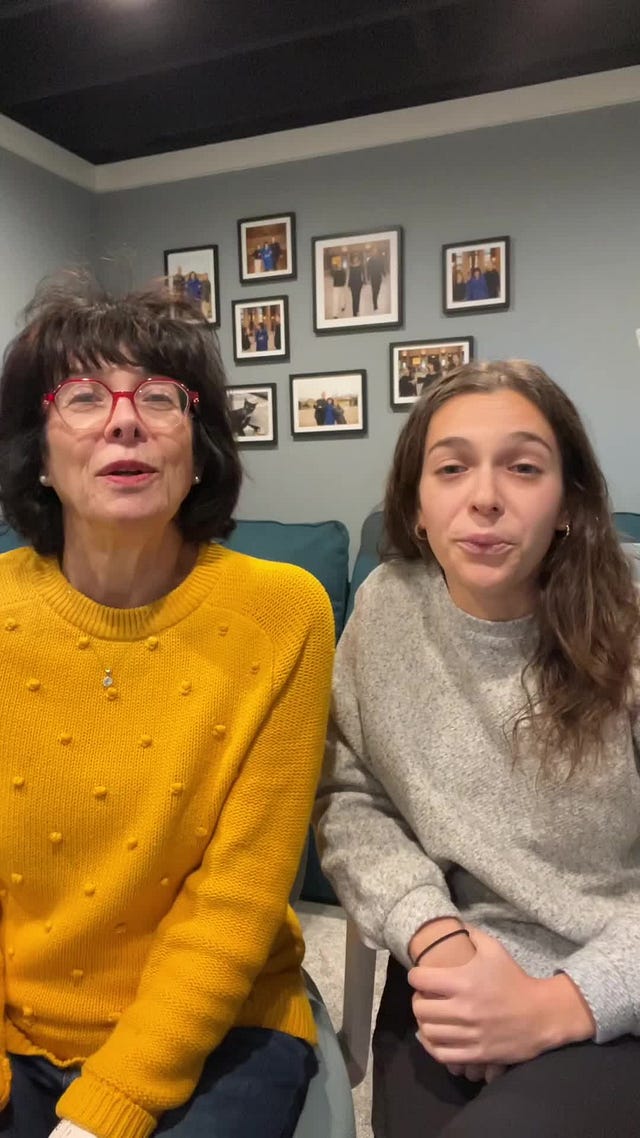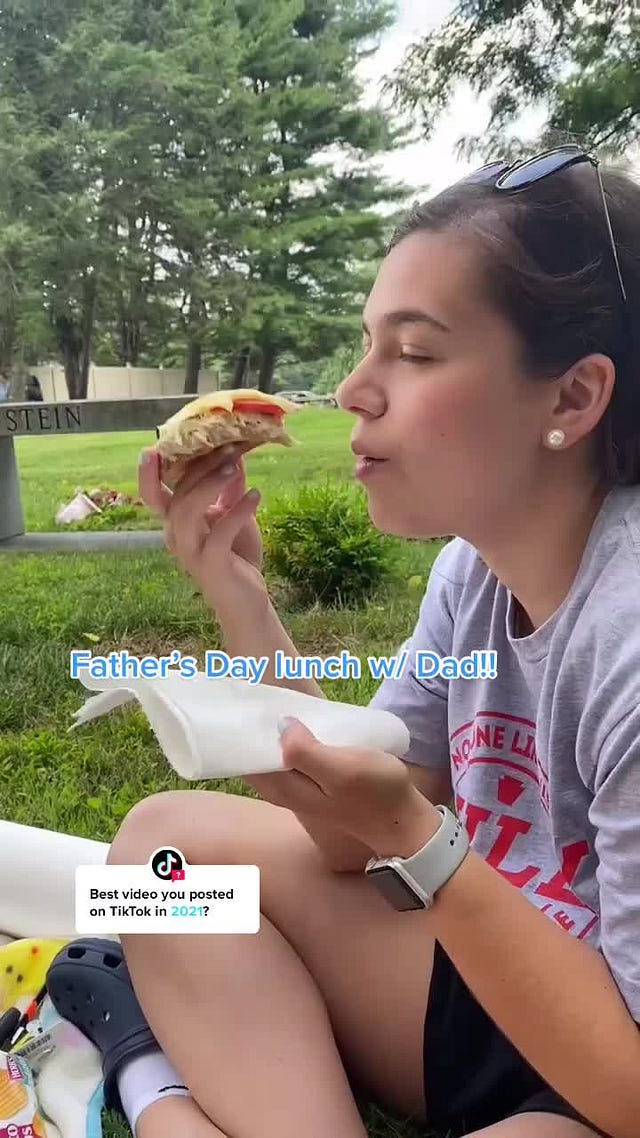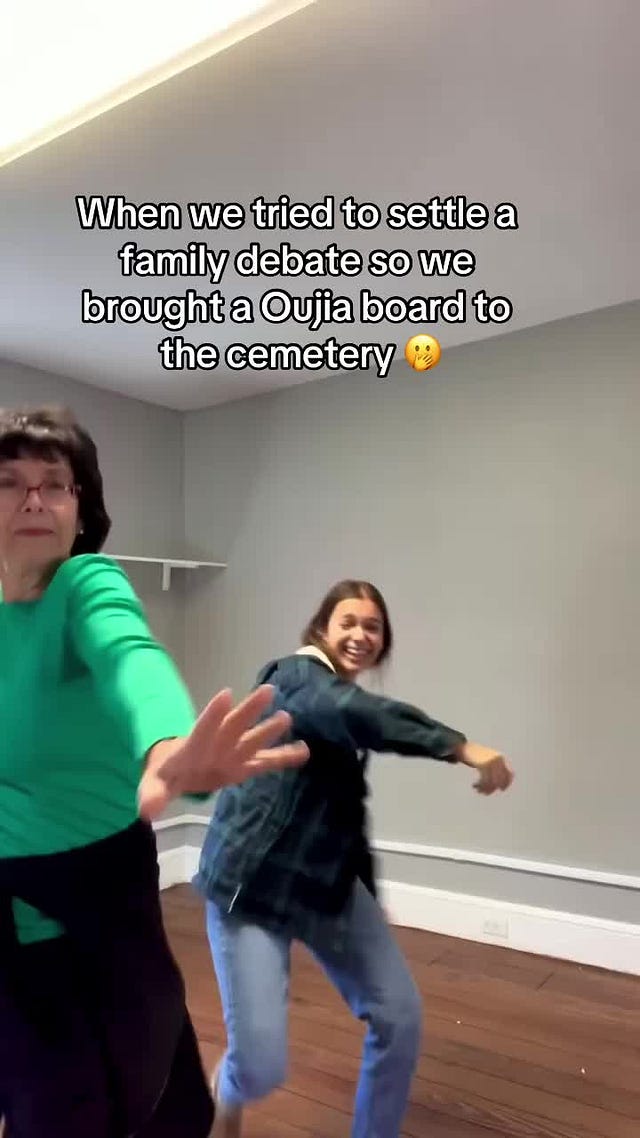"Here Mark, Have a Fry." Laughter and Grief with Robin Rosenthal
Dirt Nap's first celebrity interview is a widower and TikTok star.
Growing up Roman Catholic and Italian-American meant mourning and grieving was serious business.
Women would exhaust themselves with performative, uncontrollable wailing. Crying is understandable. Having a sister on your arm to keep you upright because you’re so overwrought with grief and nearly collapse when every family member enters the room? It straddles the line, but my Aunt Anna did it when my Uncle Frank died and she was always a bit dramatic.
The boundary between authentic grief and showmanship, for me, was flopping yourself on the ground and screaming in Italian — as I’ve witnessed on more than one occasion — or yelling in church that God took her husband/son. Histrionics are always about the show.
Anyhow, women in mourning had work to do. It’s physically exhausting to be the emotional bearer of, well, all emotions and feelings for a generation (and family). An Italian mother of a certain age laughing inside a funeral home? Not a chance.
The men? Ehhhh, the men got to be men. They got to black slap and shake hands and laugh and do the light work…sort of like Thanksgiving dinner. The wives and mothers would spend all day cooking and my uncle would jump in at the end to carve the turkey and collect the flowers. Women do the work; men do some knife stuff.
Laughter is an elixir for many conditions, particularly when it comes to lightening the mood in a serious moment. I’ve been accused of injecting humor at inappropriate times because I’m emotionally and/or professionally incapable of being serious1. Sometimes it’s true that I deflect with humor; other times, it’s because the tension is so high that it needs ratcheting down2.
Laughter in the face of grief is important, if only because it provides respite. Being stuck in a place of despair has a greater impact than just one’s emotions. It bleeds into your ability to function physically and mentally. There’s plenty of time to grieve, but the periodic, momentary endorphin release caused by finding something funny provides a break in the suffering.
The science is there to back this up. A study in the American Journal of Hospice and Palliative Care showed that humor was present in 85% of nurse-based hospice visits, with 70% of the humor initiated by the patient3. Laughter stimulates cardiovascular organs, the brain, and muscles; it relieves stress and soothes tension; it improves your immune response and lessens depression.
My mother died on a Friday night in September 1997. Saturday was a slog of meetings with funeral homes and our parish priest, and Sunday was the wake. Sunday night, friends of mine who came in for the calling hours and funeral came over to help put a dent in the food that had been dropped off and gave me a break for a few hours where we laughed a lot.
After my wife’s grandmother died, I distinctly remember having a post-wake gathering her aunt’s house. For three hours, we laughed ourselves hoarse over the revelation of the Italian names of her great uncles (Uncle Bimbo’s given name was Agapido, which sounds like a war cry), and how her late great aunt Rita didn’t know how to make left turns with her car, was too short to see her rearview mirror and the dozens of near collisions of her vehicle and grandchildren. It provided her aunt and mother with that break from the grief and mourning to restore and renew in advance of the next day, when they would bury their mother.
And then you take the story of Robin Rosenthal. Thirteen years ago, Mark Rosenthal had a fatal heart attack and died in their Bucks County, Pa. home. After arriving at the hospital, staff sent a minister to the family to pray with them.
A Christian minister.
Praying to Jesus Christ.
With the Rosenthals, a Jewish family.
They laughed hysterically.
And the laughing continues. Robin and her children, Sam and Emma, are the faces of It’s The Rosenthals, a Tiktok account with 1.6 million followers (and another 618,000 on Instagram). I came across the account one evening while scrolling Instagram reels. Emma and Robin were doing the “We Listen, but We Don’t Judge” trend of admitting things they were hiding. And, because Instagram’s algorithm is what it is, I started getting more and more videos from them, but I couldn’t figure out why they were hanging out in a cemetery.
 Tiktok failed to load.
Tiktok failed to load.Enable 3rd party cookies or use another browser
After flipping through the account, I realized that Robin and her children were coping with the pain and loss of their husband and father by laughing out loud and sharing it with others. And, through it, they’ve established a grief community. You see it in the comments, people dealing with their own grief and finding the common bonds of the Rosenthal family, or laughing when Robin brings a kiddie pool to the gravesite to throw Mark a pool party for Father’s Day.
 Tiktok failed to load.
Tiktok failed to load.Enable 3rd party cookies or use another browser
Robin was gracious enough to answer a few questions for Dirt Nap.
I recently found your Instagram account and got hooked on the story of the caretaker you hired for your mother (Post 1 | Post 2. But, it wasn’t until I watched your older videos that I realized that the intent of It's The Rosenthals is really about coping with the loss of your husband. How did the family decide to share this openly with the world on social media?
It was really by accident. Both the kids came home during the Pandemic and they started putting videos up of me online. We were already making funny videos, so in June 2021 when we went to the cemetery to visit Mark for Father’s Day, we filmed a video doing what we usually do. Having a picnic at the grave and saying “here, Mark, have a fry” was all just real. When we put it up on TikTok and saw how many people connected with grief and our humor surrounding grief, we decided to truly open up about our whole loss story.
 Tiktok failed to load.
Tiktok failed to load.Enable 3rd party cookies or use another browser
Can you tell me how your husband died? How old were your son and daughter?
He dropped dead of a heart attack. And I don’t say that for dramatics. He did really “drop” dead. I heard him collapse in the bathroom in the middle of the night and I called 911. I got Emma out of bed and she performed CPR until paramedics arrived. When we got to the hospital they told us that he didn’t make it. Emma was 14 at the time and a freshman in high school, and Sam was 17 and a freshman in college.
What was life like in the aftermath? How did your grief evolve to a place where you could laugh openly?
The humor pretty much started right away when the social worker in the hospital had us pray to Jesus (we’re Jewish) and we thought it was hilarious. Mark was that way. He was a really jovial guy and could really laugh through any situation. But life really went back to a “new normal.” We were incredibly busy. My mother was in hospice at our house at the time so we had to take care of her. Emma played field hockey and we were always going to tournaments. And Sam swam in college so we were always going to see him. We really kept ourselves busy throughout our entire grief journey. In tragedy, you can either hide under the bed, or you can get up and keep moving forward. The kids and I kept moving forward.
It’s been said that you can see the love in a family that laughs together, and you all certainly do quite a bit of that. How did humor help your family cope in the months and years following your husband’s death?
We’ve always been extremely close through all sorts of change. Mark had a lot of jobs and we had a lot of moves. We moved the kids from Texas to Nebraska to all around Pennsylvania, and we laughed and had fun through it all. So after he died, we kept that same tight-knit spirit.
What have you learned about yourself and your family in making this content?
I have learned that we can work together. Who would’ve thought I’d be in business with my kids? And I really enjoy my kids as adults. People ask all the time how we’re so close, but I am so lucky that the three of us get along so well. The huge thing that I’ve learned though is that the three of us have each other’s backs. It’s been fourteen years since Mark died and the three of us have unwavering support for one another. I know that is really rare.
 Tiktok failed to load.
Tiktok failed to load.Enable 3rd party cookies or use another browser
Have you seen a community form around you due to the content you are creating? That other people are sharing their grief experiences with you?
Grief is one of the only things in this world that is universal but people still don’t know how to talk about it. I think we’ve really helped people see that it’s okay to be open about grief- to laugh, to cry, to feel all those feelings. One of the main things that really helped us right after Mark died was our bereavement group — Safe Harbor. It was a group for grieving teens and kids who had lost a parent/sibling. The kids would meet at the same time that the parent group would meet and it was just amazing to be in a room with people who just got it. My same widow/widower group from Safe Harbor still gets together all these years later — it’s just a really special bond.
But we know how lucky we were to have that group. Most people experiencing grief aren’t as fortunate. But I think we’ve created a community online kind of like Safe Harbor. We put our story out there to tell people grieving that we get it. We get so many messages of people who have lost a loved one thanking us for making them laugh or showing them how to talk it.
While Emma is just as visible in the videos, you are very much the star. It seems to parallel your role as the parent and anchor for the family. How did you adjust to your new(ish) found fame and balance it against the emotions of the topic you’re working with?
Make no mistake, Emma is the boss. She’d say that she gets that from me, and well, the apple doesn’t fall far from the tree. I may be the star, but the kids tell me to stay in my lane! I try! As far as emotional balance, I don’t think there really has been an adjustment. What you see online is what you get with us. It’s all real. We’re so lucky to have a platform where we can get vulnerable and show people that’s okay. The balance for us though is where is the line? What moments do we have for just our family versus what we share with the world? It’s a line that we’re constantly talking about.
One thing that hit me was the video you made recently about all of the things that happened since he died. There must be some bit of coping and grief management in there for you to mark his passing with this annual reminder of what he’s missed.
Emma jumps in on this answer: Fourteen years later that is the toughest thing everything that my dad has missed. We actually all felt really sad and anxious after making that video because so much has happened! For me, I’ve now been alive as many years without my dad as I was with him, and that gap will continue to grow. But our lives are truly so different now. We often talk about what he would think- we live in a different house, drive different cars, have different pets, different jobs, the people in our life are different, even our local grocery stores have changed names! But that’s one of the coolest things about our viral moments online. Millions of people know my dad’s name.
What’s next for It's The Rosenthals? I imagine the wedding is going to provide ample content.
We really never know what’s next! That’s the fun part about our slice of life style comedy. We just film whatever life sends our way. And for this year, yes, that will definitely be wedding content!
 Tiktok failed to load.
Tiktok failed to load.Enable 3rd party cookies or use another browser
Robin Rosenthal and her children Sam and Emma are the family behind It’s The Rosenthals on TikTok and Instagram, and The Robin’s Nest podcast.
Final Thoughts on Finality
“I’ve seen a look in dogs’ eyes, a quickly vanishing look of amazed contempt, and I am convinced that basically dogs think humans are nuts.”
— John Steinbeck
Dirt Nap is the Substack newsletter about death, grief and dying written and edited by Jared Paventi. It’s published every Friday morning. Dirt Nap is free and we simply ask that you subscribe and/or share with others.
We are always looking for contributors and story ideas. Drop a line at jaredpaventi at gmail dot com.
I’m all over social media if you want to chat. Find me on Facebook and LinkedIn. I’m also on Bluesky, and doom scroll Instagram at @jaredpaventi.
If you or someone you know is in crisis, call or text 988 to reach the Suicide and Crisis Lifeline or chat live at 988lifeline.org. For additional mental health resources, visit our list.
True story. It was in a performance review once.
In this case, it was a former supervisor who was born without a sense of humor and believed that our work was the most important thing anyone in the area was doing.
Adamle KN, Ludwick R. Humor in hospice care: who, where, and how much? Am J Hosp Palliat Care. 2005 Jul-Aug;22(4):287-90. doi: 10.1177/104990910502200410. PMID: 16082915.













"In tragedy, you can either hide under the bed, or you can get up and keep moving forward. The kids and I kept moving forward."
I love that line. I love their TikTok page. Great interview!